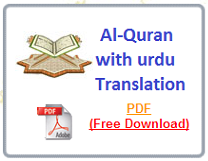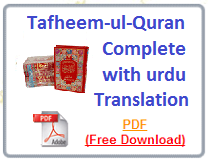Introduction
The Holy Qurán is the most widely read book in the history of mankind, a source of immense inspiration, guidance and wisdom for millions of Muslims all over the world. It is the pivotal point of imaan, faith, and integral to the foundations of an Islamic society being the basis of its shariah, Islamic legal injunctions and law.The Quran is not a book of history. It is a book of guidance. It is a book of wisdom. The Quran refers to historical events from which one can receive guidance and gather wisdom. One may therefore legitimately ask: What is the significance of a translation of the Quran in an Encyclopedia of Islamic History?The answer quite simply is this: It is impossible to understand Islamic History without an understanding of the Quran.






Meaning of the Word Qurán
The Holy Qur’an is the literal word of Allah (swt), divinely revealed to Prophet Muhammad (saw) through the Angel Gibraeel (as).
The word Qur’an can be derived from four root words, each with their own individual meanings. The first root word is “qara’a” whose literal meaning is to collect or to compile. In this respect the Qur’an is a book which was collected and codified under the divine protection of Allah (swt). When Angel Gibraeel (a.s) used to bring the divine revelation of Allah (swt) to the Holy Prophet Muhammad (saw) he had already been instructed by God to reveal the exact placement of each ayah (in the relevant Surah) as well as the arrangement of the Surah’s and their names. Since this was the case it was impossible for others to interfere in the Qur’an in any manner or form. It will remain in its actual and original state until the Day of Judgement the Qur’an itself testifies to its divine protection:
“It is for us to collect and recite it” (75:17)
In the context of the Qur’an, the word qara’a is also taken as being the book which contains all knowledge of the universe. Every as aspect of life as we know has been codified and collected within it[1]. An answer to any question man wishes to have answered can be found in the verses of the Holy Qur’an:
“And we have sent down to thee the Book explaining all things, a guide, a mercy and glad tidings to Muslims”. (16:89)
“A detailed exposition of every thing”. (12:11)
“We have omitted nothing from the book”. (6: )
The second root word is “qar’ana” meaning a union or conjunction. The root word does not specify what the union consists of, merely that a process of combination is indicated. In reference to the Qur’an this refers to the literal physical existence of the Qur’an and its properties. Imaam Fakr-al-Deen Razi quotes Imaam Sufyan Sorri as stating that the Holy Qur’an was given its own special name because letters are joined to make words, words are joined to make ayahs, ayahs are joined to make surahs and surahs are joined to make the Qur’an. This beautiful combination of literature has produced the most magnificent book in the world.
Another academic implication of the word “qar’ana” is that the Qur’an is combined with guidance, the two being inseparable. The Holy Qur’an refers to this combination:
“This is the book: it is guidance sure, without doubt”. (2:2)
“Here is a plain statement. To one, a guidance and instruction to those who fear Allah”. (3:138)
“For one who had certainly sent unto them a book, based on knowledge, which we explained in detail; a guidance and mercy to all those who believe”. (7:52)
“There are clear evidences to me, and a guidance and mercy to those of assured faith”. (45:20)
The third root word is “qira’athun” meaning to read or recite. In reference to the Qur’an this is one of its most important features. Although other books that claim to be divinely revealed are also read and recited, the Holy Qur’an has a specific characteristic, superiority and individuality compared to them. This is because it is the most widely read book in the world. Millions of Muslims all over the world recite it in their daily prayers 5 times a day. The Qur’an is read and recited daily in what is called ‘tilawat’ where Muslims read the Qur’an whenever they have some spare time to get the Blessings of Almighty Allah. During the month of Ramadhan the entire Qur’an is recited over a period of 30 days in the special ‘tharawih prayers [2]’, as well as being individually read by Muslims in their homes. Often, during this month of fasting, each member of the household will have completely read and finished the Qur’an at least once if not twice.
As well as being read and recited, the Qur’an acts as a practical guide in all affairs of Muslims, be they social, cultural, legal, economic or political. Unlike its biblical counterpart, the Qur’an does not merely contain stories of Prophets or an analogue of Islamic history. Rather it contains an array of topics to be of use in ones daily life. Codes of behavior and their limits are explained, mutual rights and responsibilities of men, women, children are laid down as well as international principles to be used to govern communities, countries and nations. The Qur’an acts as a practical guide of life to Muslims in the personal and official spheres of life. To make it more accessible to different nations and peoples of various countries, it has been translated in almost every language of the world.
Furthermore, from the period of the Holy Prophet (saw) up until the present day some 1400 hundred years later, millions of Muslims have learnt the Qur’an off by heart[3]. It is unimaginable how many people must have learnt the Qur’an over the last 14 centuries, suffice to say no other book can claim to have these particular traits attached to it. And this trend and inclination will continue till the Day of Judgement.
The fourth and final root word of the word Qur’an is “qira’in” which is the plural of “qarina” which meaning evidence, argument or symbol. In the context of the Qur’an this is taken to mean how one verse interprets, elaborates and gives arguments and evidences for previous verses. In ayah 5 of surah Al-Fatiha[4] for example, man is told to ask Allah for the right path:
“Guide us Thou on the right path”.
The following verse then answers this request and explains what the right path is:
“The path of those whom You have favored. Not those who have earned your anger or gone astray”. (1:6-7)
So the Qur’an is self-evident and self-explanatory. If one verse gives a general meaning than the other gives a more specific definition. Similarly if one verse gives an absolute commandment then the other verse will gives its exceptions and qualifications. The Holy Qur’an testifies to this fact:
“Oh mankind! Verily there has come to you a convincing proof from your Lord for we have sent into you a light (that is manifest)”. (4:174)
Moreover the Qur’an contains 100’s of evidences of its own truthfulness being the best evidence of the truth of its claim. That is why a challenge was given to the non-believers that if all of mankind and jinn kind were to come together to create a similar or equal book to that of the Qur’an they would fail, this being an impossibility:
“Say. If the whole of mankind and Jinns were to gather together to produce the like of this Qur’an, they could not produce the like thereof, even if they backed up each other with help and support.” (17:88)
Fourteen hundred centuries have passed and no change or alteration has taken place in the Holy Qur’an. The text that is present today is exactly the same text that was revealed to Prophet Muhammad (saw). This is so despite hundreds of attempts by non-Muslims to try and insert alterations and changes into the Qur’an. That is why Allah (swt) himself gives it divine protection:
“We have, without doubt, sent down the message; And We will assuredly guard it (from corruption”. (15:9)
Just as there have been no alterations made to the Qur’an, similarly there are no conflicts or contradictions in the text of the Holy Qur’an. If one reads the beautiful verses each one compliments the next. The surahs and ayah’s of the Qur’an work in consistent harmony with each other. The Holy Qur’an is truly a uniform piece of work. In contrast the Encyclopaedia of America for example states that there are about 30,000 errors in the text of the bible and in its various versions. Although the accuracy of this type of observation is open to debate, what is clear is that any book that claims to be divinely revealed would surely not even entertain one error let alone hundreds or thousands of errors. The very nature of God, His Omnipotence, All Knowing and Most Powerful nature presupposes that His divinely given book would be clean of all mistakes. Indeed the Holy Qur’an is a living testament to that fact.
Names of the Holy Qur’an
The Qur’an has been referred to by many different names in the holy text. The word Qur'an itself can be found in the scriptures:
"We do relate unto you the most beautiful stories, in that We reveal to thee this (portion of the) Qur'an: Before this thou too was among those who knew it not." (Yusuf, 12:3)
"Nay this is a glorious Qur'an (inscribed) in a tablet preserved". (Al-Buruj, 85:21-22)
However Allah Almighty refers to the Holy Qur'an using several other names:
al-nur the light (7:157)
al-hukm the judgment (13:37)
al-dhikr the reminder (15:9)
al-kitab the scripture (21:10)
al-furqan the criterion (25:1)
al-tanzil the revelation (26:192)
